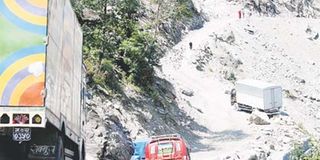Will a political dispute become a humanitarian disaster in Nepal?

Distributing relief supplies to remote districts will become even harder as snow blocks off mountain passes. PHOTO | IRIN
What you need to know:
If left unresolved, hundreds of thousands of quake survivors, many of them still living without proper shelter, could suffer shortages this winter.
Eight months after a huge earthquake devastated Nepal and killed almost 9,000 people, an import-crippling border blockade provoked by a political dispute has sent prices skyrocketing and is stalling efforts to rebuild.
If left unresolved, hundreds of thousands of quake survivors, many of them still living without proper shelter, could suffer shortages this winter.
Nepal’s parliament is set to begin debating amendments to a new and controversial constitution that could help resolve tensions and head off a humanitarian crisis.
After almost 10 years of political deadlock that followed a decade-long civil war, the constitution was pushed through quickly in the wake of the two earthquakes in April and May this year. The constitution was approved on 20 September – and it was hoped that doing so would free up the government to concentrate on reconstruction – but it was met with resistance from the start.
Members of the ethnic Madhesi and Tharu minorities oppose the constitution. Among other points, they say the size and shape of the seven new provinces created will reduce their political representation.
The Madhesi live in the lowlands of mostly-mountainous Nepal, on the Terai plains, as well as across the border in India. Many of them have – with quiet backing from Delhi – shown their displeasure with the constitution by mounting mass protests that have blocked goods coming into Nepal. India is by far the largest source of imports to the landlocked nation, and the blockade has crippled the economy and severely impaired efforts to rebuild since the earthquakes.
Nepal’s parliament has tabled a bill that could amend the constitution to change the electoral make-up and the representation of various groups in political bodies. But it’s unclear if the amendments – even if they were made – would be enough satisfy the protestors. The United Democratic Madhesi Front, which has been leading the protest movement and negotiating with the government, says the language of the bill is too vague and needs to be changed.
“If it passed through parliament as is, it will not address the demands of the movement,” Upendra Yadaf, a UDMF leader, told IRIN over the phone from the Nepali capital, Kathmandu.
Using near identical language in separate statements, major donors from Germany, Britain and South Korea, as well as UN agencies and UN Secretary-General Ban Ki-moon, have urged “all sides to address restrictions on imports”.
So far, negotiations between the government and the UDMF have come to naught and tensions remain high. More than 40 people have been killed since the protests began, including one who was shot by police on Sunday. As civil unrest continues on the border, and discussions proceed in Kathmandu, the situation for most people in the country is only getting worse.
“WFP urges all sides to once again allow the free flow of food items across the border to ensure that Nepalis, especially those who struggle on a day-to-day basis to feed their families, are not the ones who bear the burden of this protracted political standoff,” Seetashma Thapa, of the World Food Programme in Nepal, told IRIN.
Even as Nepal struggles to rebuild after the quakes that destroyed or damaged almost a million homes, aid agencies warn of another looming humanitarian crisis. Fuel shortages are preventing shipments of emergency supplies like blankets and tarpaulins to remote communities, and time is running short, as winter snows begin to block access roads and trails.
Cooking gas has shot up in price by as much as 630 percent since the blockade began, while the cost of rice has doubled and commodities like cooking oil and lentils have risen sharply as well, according to WFP. The fuel shortage has caused “severe delays” in the organisation’s ability to get food to more than 224,000 people.
The writer filed this article for IRIN from Phnom Penh




